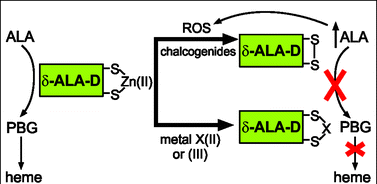Aminolevulinate dehydratase (δ-ALA-D) as marker protein of intoxication with metals and other pro-oxidant situations
Abstract
δ-ALA-D is a metalloenzyme that has 3 vicinal

* Corresponding authors
a
Centro de Ciências Naturais e Exatas, Programa de Pós-Graduação em Bioquímica Toxicológica, Universidade Federal de Santa Maria, Santa Maria, RS, Brazil
E-mail:
jbtrocha@yahoo.com.br, criswn@quimica.ufsm.br
Tel: +55 55 3220 9462
δ-ALA-D is a metalloenzyme that has 3 vicinal

 Please wait while we load your content...
Something went wrong. Try again?
Please wait while we load your content...
Something went wrong. Try again?
 Fetching data from CrossRef.
Fetching data from CrossRef.
This may take some time to load.
Loading related content
